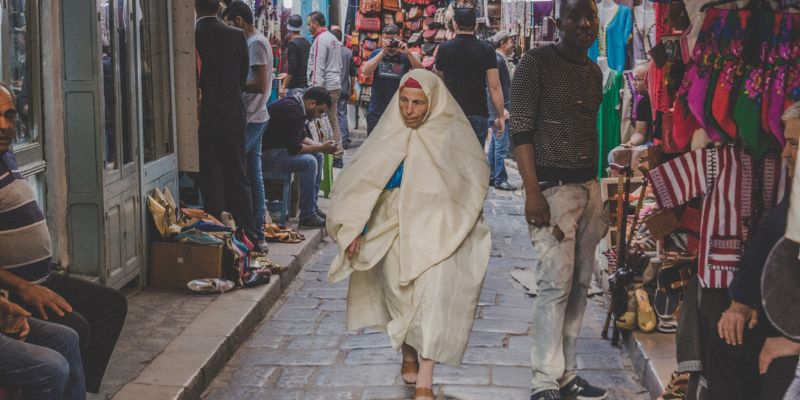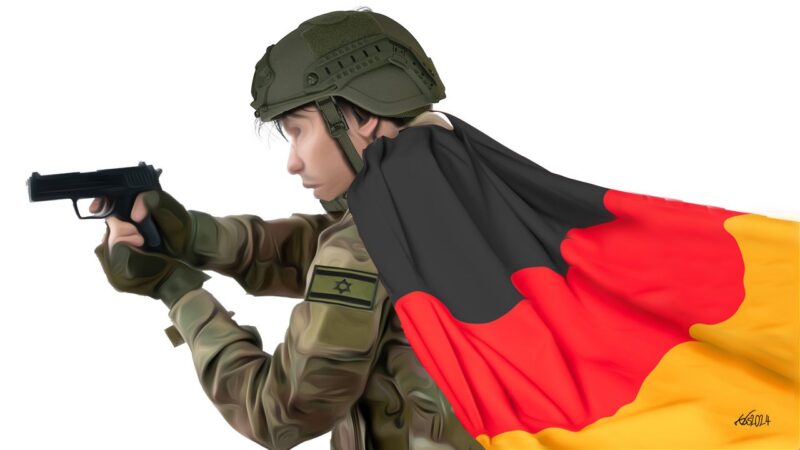The recurring reports of violence, racism, and xenophobia against undocumented “sub-Saharan” African migrants in Libya and in Tunisia are very concerning. Prompt scrutiny into a complex and often dangerous public discourse about cultural identity, colonialism, and racism in the north of the continent is needed.
Though this discourse and its attendant violence have a longer history, recently Tunisia’s President Kais Saied said such populations (in reference to West and Central African undocumented migrants) are turning Tunisia into “a purely African country with no affiliations to the Arab and Islamic nations”—as if being African is contradictory to being Arab or Muslim. His words intentionally overlook the fact that large numbers of people on the continent identify as Arab and African, African and Muslim, or Arab, African, and Muslim. The construction of blackness as foreign to northern Africa (as imported with slavery and associated with stigma) has only reinforced a false notion of “North Africa” and “sub-Saharan Africa” as two separate racial and cultural entities. Such a discourse of belonging that alienates west and central Africans (and also makes invisible the populations of the Sahel) must be urgently examined and challenged more than ever since it has direct implications for the lives of migrants both in Tunisia and Libya.
It is important to understand that the racialization of West and Central Africans in the region as the “other” is part of a larger discourse that reinforces the myth of northern Africa’s racial and ethnic homogeneity (i.e., Arabs, i.e., not black) and contributes to the stigmatization of dark-skinned northern Africans. It also resonates with how many in the northern region itself perceive themselves primarily as part of the Middle East, which has repressed the historical, cultural, and spatial dimensions of our identities as Africans who are indigenous to the continent and who have ancestral ties to populations from other parts of the continent. This notion of belonging, although historically inaccurate, has only worked to license violence against populations who already live very precarious lives and who are racially more connected to us than we would like to admit.
Additionally, it has also revived a long-standing colonial legacy of racial and ethnic labeling. The colonial remapping of the continent went hand-in-hand with a process of reinventing its populations. France used Social Darwinism in ways similar to other European imperial powers to study African populations. It was intent on de-Africanizing northern Africans (most of whom are Amazigh and indigenous to the continent) and racializing them as Arabs, while populations south of the Sahara became racialized as black and African. The British also attempted to label northern Africans. The British anti-slavery report, for instance, concluded that except for the small population of Fes, Moroccans are “coloured” people with some of their dignitaries being of the “darkest guinea dye.” This is yet another illustration of the arbitrariness with which colonial powers categorized African populations.
Decades later, we can see how this colonial practice persists and is used to perpetuate racism and xenophobia in the region. The French colonial invention of Arab vs African, or Arab vs black is still being reproduced in the 21st century. With this in mind, it was difficult to ignore the hypocrisy of French media outlets as they objected to Saied’s problematic statement. I watched with incredulity as they talked about his “anti-black” racism—the duplicity starkly unmissable in the objection since Saied was using the same colonial racial labeling that France invented and perpetuated in the first place. Saied has given the French media exactly what France needed: a chance to (re)produce racial and ethnic division in the continent, “a divide and conquer” approach that has been the state’s main strategy of colonization. I am in no way implying that this recuses northern African countries from racial violence and xenophobia. It certainly does not, but as France’s power and reputation are dwindling in the region the timing of President Saied’s words could not be more appropriate.
What has become increasingly evident in the last few years is the waning hold of France over its former colonies, in part due to growing intracontinental trade that is rendering the continent less dependent on France’s economy. President Emmanuel Macron’s desperate attempt to salvage his country’s reputation in the region during his “Africa Tour” in March was greeted with resounding protests and demonstrations. The irony could not be ignored as he proceeded to express France’s desire for a “more equitable” relationship with the continent, or what he called “new partnerships,” while making it abundantly clear that France had no intention of putting an end to its colonial policies. This tour came after his failed attempt to assert France’s power at the summit of the International Organization of Francophonie last year. The summit took place amid growing protests against France’s colonial policies, including its military intervention in the region, its exploitative financial policies, and its control of the continent’s natural resources. But Macron, undeterred, or perhaps unable and unwilling to read the signs, continued his colonial tirade, going as far as declaring French the universal language of the continent and the language of pan-Africanism!
There is a silver lining, nonetheless. The mobilization taking place in both Tunisia and Libya to protect the human rights of African migrants is promising. It is obvious that a public policy on immigration centered on the respect of human rights of migrants is the only way forward. In this regard, Morocco has been ahead of the curb. Faced with waves of violence against west African migrants almost a decade ago, Morocco developed a global immigration policy—the first of its kind in the region—that led to the regularization of 25,000 undocumented migrants from west and central Africa in 2014. This was followed by a second phase, launched in 2017, that saw the regularization of another 25,000 undocumented migrants. This by no means implies that Morocco is a haven for migrants. In fact, more reforms are needed, as migrants who arrived in the country post-2017 continue to find it extremely difficult to achieve legal status. But the case of Morocco indicates that developing immigration policies that protect the rights of migrants is the first step in limiting and countering violence.
Furthermore, because of the restrictive policies of European borders, the number of migrants to the northern regions of the continent continues to grow and necessitates a migration policy that is inclusive and sustainable. One hopes that the current investigation into Libya’s detention centers and violence against migrants brings more awareness about the breach of migrant and refugee rights in general. We in the northern region cannot afford to be xenophobic or hypocritical. As countries with high rates of emigration and with almost one-third of our populations residing in Europe (I am talking specifically about Morocco, Algeria and Tunisia) we cannot look down on other African migrants nor criticize their human right to mobility.
Northern Africa is not facing a “foreign” presence as Saied would like us to believe, but a familiar one since the boundaries between what we consider the North and sub-Sahara (without excluding the Sahel) have always been fluid and permeable. It is this permeability that offers resistance and remains in stark contrast to the colonial spatial division of “Arabs” and “Africans.”
–
This post is from a partnership between Africa Is a Country and The Elephant. We will be publishing a series of posts from their site once a week.








